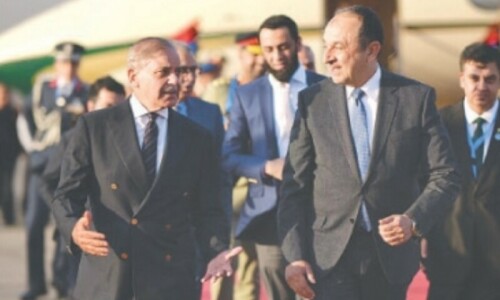
ISLAMABAD: Pakistan on Friday proposed to India a dedicated dialogue on Kashmir and a bilateral moratorium on testing of nuclear weapons.
The new proposals were announced by Adviser to the Prime Minister on Foreign Affairs Sartaj Aziz at a news conference at the Foreign Office. The announcement followed last week’s envoys conference which discussed critical foreign policy challenges.
In view of the situation in India-held Kashmir, “Pakistan would invite India for a dialogue on Jammu and Kashmir dispute,” Mr Aziz said, adding: “Foreign Secretary Aizaz Chaudhry would formally be writing to his counterpart in this regard.”
More than 70 people have been killed in the held Valley since protests erupted on July 8 after the killing of militant commander Burhan Wani by Indian security forces.
Islamabad also proposes bilateral moratorium on nuclear testing
The dialogue between India and Pakistan, which has a strand on Kashmir, has remained suspended since 2014. The agreement on reviving the peace talks, which was reached during Prime Minister Narendra Modi’s surprise stopover in Lahore last December, could not materialise because of the Pathankot airbase attack. The recent uprising in the Valley, which Indian security forces are brutally putting down, has added to strains in ties.
Mr Aziz said India’s policy of not engaging in a comprehensive dialogue with Pakistan was not conducive for peace in South Asia. Pakistan, he underscored, would continue to extend full diplomatic, political and moral support to the Kashmiris’ movement.
NUKE NON-TESTING: Mr Aziz, meanwhile, offered India to sign a bilateral moratorium on nuclear testing.
“We have declared a unilateral moratorium on further testing. Pakistan is prepared to consider translating its unilateral moratorium into a bilateral arrangement on non-testing with India,” he said and recalled Pakistan’s support for the Comprehensive Test Ban Treaty.
The proposal is unlikely to get a favourable response from India, which is deeply opposed to any regional nuclear mechanism and has been refusing discussions on a Pakistani proposal for Strategic Restraint Regime since October 1998. But Pakistani experts believe that a negative response to the Pakistani proposal could raise questions about India’s commitment to non-proliferation.
The move is related to Pakistan’s candidature for the Nuclear Suppliers Group (NSG). The group failed to develop a consensus on induction of non-NPT states at its last plenary in Seoul, but had then decided to continue consultations on the matter.
Backers of Indian bid for entry into the NSG are expected to make another attempt over the next few months for getting India admitted. Therefore, Pakistan has decided to intensify its diplomatic outreach. In this regard, the government would send Sartaj Aziz, Special Assistant to the Prime Minister on Foreign Affairs Tariq Fatemi and Aizaz Chaudhry to NSG capitals for lobbying.
“We welcome any opportunity to engage bilaterally with interested NSG countries for a detailed presentation on the merits of our application,” Mr Aziz said, maintaining that earlier efforts for lobbying had yielded positive results.
“Our arguments for criteria-based approach, and the impact of any India-specific exemption on the strategic stability in South Asia and on the future of non-proliferation regime, have been accepted by several NSG countries,” he said.
A number of countries led by China had at the last plenary meeting insisted on fulfilling the NPT criteria for new admissions and objected to India being given special treatment.
“Pakistan hopes that on the question of membership, established NSG procedures and modalities for discussions would not be bypassed, once again, to rush a country-specific waiver that disregards non-proliferation objectives,” the adviser added.
He said that NSG troika — comprising the NSG Chair and previous and future Chairs — had been invited to Pakistan for a briefing on the country’s credentials.
“We will continue to project Pakistan’s solid credentials based on its technical experience, capability and well-established commitment to non-proliferation, nuclear safety and security,” Mr Aziz added.
Published in Dawn, August 13th, 2016












































Dear visitor, the comments section is undergoing an overhaul and will return soon.